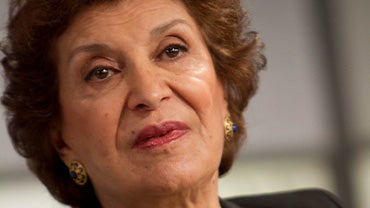
The Georgetown University Library is pleased to announce the exceptional gift of the Afkhami Collection, consisting of the personal papers of Mahnaz Afkhami and her late husband, the respected scholar Dr. Gholam Reza Afkhami, as well as the archives and library of the Foundation for Iranian Studies. Together, this vast collection of primary source documents, oral histories, books, photographs, papers, and reports (both published and unpublished) chronicle the half-century of modernity and change before the Iranian Revolution.
Filling a lacuna of important, irreplaceable records, the Afkhami Collection includes first-hand accounts, previously unreleased documentation, and a formidable aggregation of published resources that describe the dynamic and often contradictory context of pre-revolutionary Iran in which women’s rights, the society, and political relationships evolved. The Collection offers unparalleled opportunities for groundbreaking research and teaching, while also enhancing understanding of this complex period of Iran’s history and providing valuable insight for generations to come.
According to Library Dean Harriette Hemmasi and Keith Gorman, Director of the Booth Family Center for Special Collections, “Georgetown University and its libraries are enriched by the receipt of this extraordinary treasure of Iranian pre-revolution historical documents and will be privileged to make the Collection accessible around the world once the materials have been processed and digitized. We are ever grateful to Mahnaz Afkhami for her immeasurable gift.”
After the 1979 revolution in Iran, many primary source documents were lost, restricted, or destroyed, and the voices of innumerable Iranians in all spheres of society were silenced. As Iran’s first Minister for Women’s Affairs (1975-1978), Mahnaz Afkhami was forced into exile from Iran in 1978. Leaving behind countless books, letters, photographs, and much of her academic work, Ms. Afkhami experienced what the loss of historical information can do to an individual. She also understood how this loss can impact a community – both how it remembers itself and how it is remembered by others.
With the goal of preserving and restoring access to the many documented and previously irretrievable accounts of Iran’s pre-revolutionary history, Mahnaz Afkhami has generously donated to Georgetown this incomparable collection consisting of more than 6,250 published volumes and 146.2 cubic feet of manuscript materials. This is one of the most complete concentrations of materials relating to Iran’s half-century of modernity and change before the Iranian revolution. In the words of Dr. Fathali M. Moghaddam, Georgetown University Professor of Psychology, this extensive collection will “serve as a bountiful research resource, for both Iranian Studies scholars and graduate and undergraduate studies.”
Foremost in the Collection is the archives of the Foundation for Iranian Studies (Foundation for Iranian Studies | بنیاد مطالعات ایران (fis-iran.org). Established in 1981 as a non-profit organization dedicated to the preservation and study of Iranian history, culture, and politics, the FIS has served as a vital platform for scholars, researchers, and intellectuals to engage in the study of Iran, particularly in the context of its modern history. FIS’s archives include oral histories and in-depth interviews with notable Iranian figures, recounting their own personal histories and memories of significant political, social, and cultural events in Iran’s recent history.
The FIS archives also contain important 20th century Iranian scholarly journals published by FIS, such as Iran Nameh and Iran Shenasi, as well as a trove of documents on music, law, development, children, and other topics. The FIS’s Pahlavi Archives constitute a valuable, unique collection of primary source material on the Pahlavi dynasty, including oral history interviews, Court calendars, films, slides, photographs, newspaper clippings, and published articles and books. The FIS archives hold book, periodical, and newspaper collections in both Persian and English.
At the heart of the FIS library is the Women’s Center archives, which encompass a wide range of original legal and historical documents and correspondence from Mahnaz Afkhami’s time as Iran’s first Minister for Women's Affairs (the second such minister in the world) and as the Secretary General of the Women’s Organization of Iran and head of the University Women’s Association at the National University of Iran. Also included are materials relating to the United Nations’ 1975 World Conference on Women in Mexico City and papers from the UN’s 1995 World Conference on Women in Beijing, the conference that led to Mahnaz Afkhami’s co-founding the Women’s Learning Partnership – an alliance of 20 organizations throughout the Global South working to promote women’s rights, leadership, and political participation. In addition, there are numerous legal documents on family legislation and civic support for professional women in Iran and a timeline of women’s milestones in Iran, both pre- and post-revolution. The scope and magnitude of information included is crucial for furthering the development of theoretical and practical knowledge that will lead to a better understanding of the condition of women in Iran and other Muslim societies.
The presence and accessibility of Ms. Afkhami’s collection at Georgetown will serve as an initial step in addressing the critical need to provide systematic preservation and access to the histories of women leaders from the Global South who have made major contributions to the global women's movement. Emphasizing the significance of Ms. Afkhami’s life work and her archive, Melanne Verveer, Executive Director of Georgetown University’s Institute for Women, Peace and Security, notes that Mahnaz Afkhami has made a “profound imprint on the world in advancing women's rights as human rights.” Verveer also observed that Mahnaz Afkhami’s work with changemakers in the Global South, “has allowed Afkhami to raise the status of women as well as document key moments in women's history globally.” The Archives will serve as a valuable learning resource and, it is hoped, will inspire the next generation of women leaders.
Once the impressive Afkhami Collection has been cataloged and digitized, this wellspring of rare, highly prized historical documents will be made available to scholars, researchers, faculty, students, activists, and the public worldwide.
